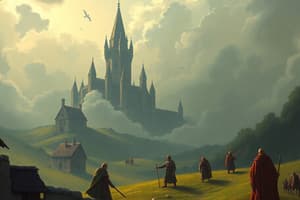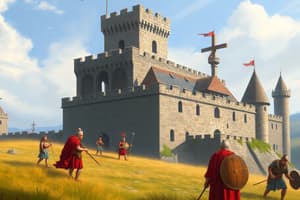Podcast
Questions and Answers
What action did the Anglo-Saxons primarily take after the Romans left Britain?
What action did the Anglo-Saxons primarily take after the Romans left Britain?
- They formed alliances with the Romans.
- They retreated back to their homelands.
- They settled in Britain. (correct)
- They launched a series of sustained attacks.
Which tribes made up the Anglo-Saxons?
Which tribes made up the Anglo-Saxons?
- Angles, Saxons, and Celts.
- Angles, Saxons, and Jutes. (correct)
- Saxons, Jutes, and Normans.
- Celts, Picts, and Scots.
What were the Anglo-Saxons motivated by to settle in Britain?
What were the Anglo-Saxons motivated by to settle in Britain?
- Finding new farmland. (correct)
- Escaping political turmoil.
- Seeking military conquest.
- Desire for trade routes.
What term describes the Anglo-Saxon word for king?
What term describes the Anglo-Saxon word for king?
How did the Anglo-Saxons generally interact with the Britons?
How did the Anglo-Saxons generally interact with the Britons?
What type of armor did Anglo-Saxon soldiers commonly wear?
What type of armor did Anglo-Saxon soldiers commonly wear?
What caused the Anglo-Saxons to have a fragmented leadership structure?
What caused the Anglo-Saxons to have a fragmented leadership structure?
What was the primary reason the Romans had to leave Britain around 410 AD?
What was the primary reason the Romans had to leave Britain around 410 AD?
What term did a king who conquered multiple kingdoms use to refer to himself?
What term did a king who conquered multiple kingdoms use to refer to himself?
Which role did thanes NOT typically perform in Anglo-Saxon society?
Which role did thanes NOT typically perform in Anglo-Saxon society?
What was the primary expectation of an Anglo-Saxon king?
What was the primary expectation of an Anglo-Saxon king?
Which of the following best describes the living conditions of ordinary Anglo-Saxon villagers?
Which of the following best describes the living conditions of ordinary Anglo-Saxon villagers?
What was the name given to ordinary Anglo-Saxon farmers and skilled craftsmen?
What was the name given to ordinary Anglo-Saxon farmers and skilled craftsmen?
What was a common reason for people trying to kill a king in Anglo-Saxon times?
What was a common reason for people trying to kill a king in Anglo-Saxon times?
How did slaves typically acquire their status in Anglo-Saxon society?
How did slaves typically acquire their status in Anglo-Saxon society?
Which of the following best describes the educational expectations for Anglo-Saxon boys?
Which of the following best describes the educational expectations for Anglo-Saxon boys?
Which task was NOT typically undertaken by women in Anglo-Saxon society?
Which task was NOT typically undertaken by women in Anglo-Saxon society?
What type of material was most commonly used to construct Anglo-Saxon houses?
What type of material was most commonly used to construct Anglo-Saxon houses?
Flashcards
Bretwalda
Bretwalda
A leader of Anglo-Saxon kingdoms who ruled over a large area.
Anglo-Saxon Kingdoms
Anglo-Saxon Kingdoms
The five main Anglo-Saxon kingdoms were: Northumbria, Mercia, East Anglia, Essex and Kent.
Thanes
Thanes
The king's advisors who travelled with him, helping him to rule and organize his soldiers.
Ceorls
Ceorls
Signup and view all the flashcards
Slaves
Slaves
Signup and view all the flashcards
Anglo-Saxon Boy's Education
Anglo-Saxon Boy's Education
Signup and view all the flashcards
Anglo-Saxon Girl's Education
Anglo-Saxon Girl's Education
Signup and view all the flashcards
Anglo-Saxon Homes
Anglo-Saxon Homes
Signup and view all the flashcards
King's Travel
King's Travel
Signup and view all the flashcards
Anglo-Saxon Village Locations
Anglo-Saxon Village Locations
Signup and view all the flashcards
What were the Anglo-Saxons?
What were the Anglo-Saxons?
Signup and view all the flashcards
What were the Anglo-Saxons known for besides war?
What were the Anglo-Saxons known for besides war?
Signup and view all the flashcards
How did the Anglo-Saxons organize their society?
How did the Anglo-Saxons organize their society?
Signup and view all the flashcards
Why were there many Anglo-Saxon kingdoms?
Why were there many Anglo-Saxon kingdoms?
Signup and view all the flashcards
Describe the weapons and armor of an Anglo-Saxon warrior.
Describe the weapons and armor of an Anglo-Saxon warrior.
Signup and view all the flashcards
Who did the Anglo-Saxons defeat?
Who did the Anglo-Saxons defeat?
Signup and view all the flashcards
What was the title of an Anglo-Saxon king?
What was the title of an Anglo-Saxon king?
Signup and view all the flashcards
Why did the Anglo-Saxons settle in Britain?
Why did the Anglo-Saxons settle in Britain?
Signup and view all the flashcards
Study Notes
Anglo-Saxon Settlement in Britain
- Roman withdrawal in 410 AD left Britain vulnerable.
- Anglo-Saxons, a combination of Angles, Saxons, and Jutes from Northern Europe, began raids around 360 AD.
- Raids involved attacking villages, Roman villas, and stealing valuables.
- Romans typically repelled the Anglo-Saxons quickly.
- Anglo-Saxons chose to settle in Britain.
Reasons for Anglo-Saxon Settlement
- Desire for new farmland
- Britain's favorable climate compared to their homeland
- Frequent flooding in homelands hindering crop growth.
- Invitation from British tribes to defend against Pict and Scot attacks
Anglo-Saxon Society
- Lack of a unified leadership; many tribes, each with its own ruler.
- Strong tribal leaders known as "cyning" (meaning king).
- Frequent warfare between Anglo-Saxon tribes for resources like land and wealth.
- Occasionally, a powerful king achieving the title of "Bretwalda" (ruler of Britain).
- Emergence of five major Anglo-Saxon kingdoms by 600 AD
Anglo-Saxon Kings and Elites
- Kings' life: difficulty from anticipated leadership in battle, assassination attempts.
- Kings' residences: large wooden halls (called halls) for meetings and family.
- King's resources: food tributes from farmers; land and treasures from conquered kings.
- Kings' attire: fine clothes, jewels, and crowns.
- Thanes (kings' advisors): assisted in governance and military organization, resided in village halls to oversee the king's laws
- Thanes' attire: expensive jewelry and fine clothing
Anglo-Saxon Commoners
- Ceorls (ordinary villagers): farmers and craftsmen (e.g., cloth-weavers, potters, metalworkers).
- Ceorls' living conditions: small wooden huts, with one room
- ceorls expected to provide soldiers for the king in exchange for living on their land.
- Slaves: captured in battles or criminals, forced labour with poor living conditions in barns;
- Women's roles: varied by social class; queen/thane's wives maintained domestic duties: weaving, sewing, childcare; poorer women worked alongside men in farming.
Anglo-Saxon Villages
- Village construction: located on fertile land near water sources; sometimes cleared forest areas.
- Village homes: simple wooden structures with thatched roofs, one room usually.
- Roles of Men and Women : Boys: learned farming, hunting, and combat skills from a young age. Girls: learned domestic skills like cooking, sewing, and childcare.
- Anglo-Saxon burials: often included possessions reflecting social status and skills.
Studying That Suits You
Use AI to generate personalized quizzes and flashcards to suit your learning preferences.




